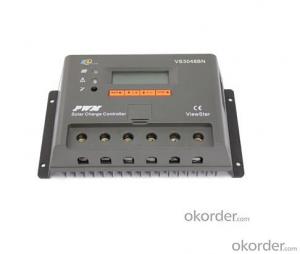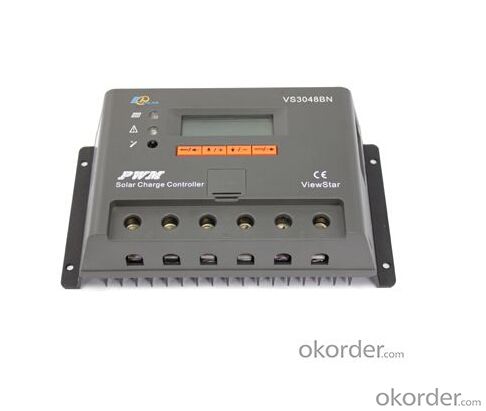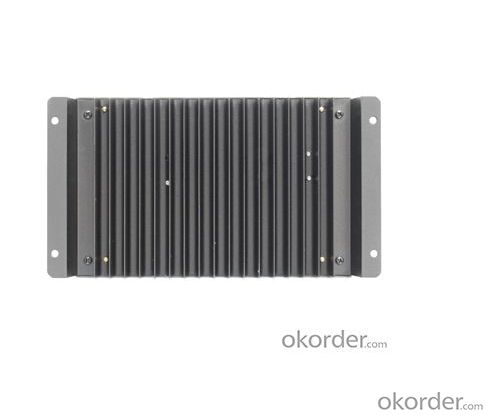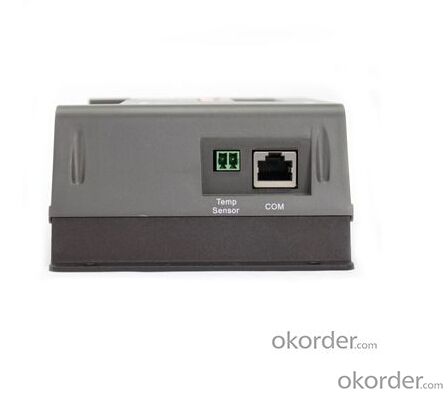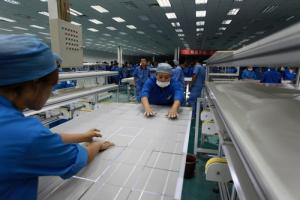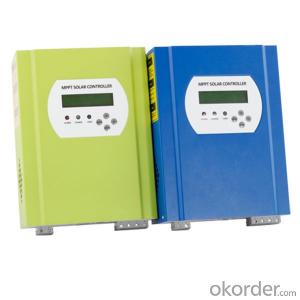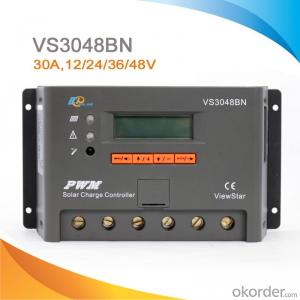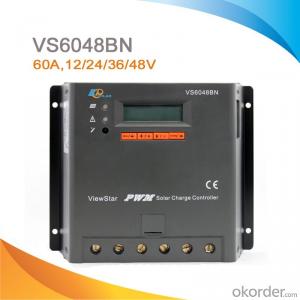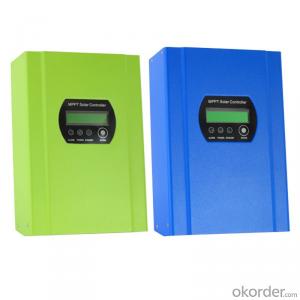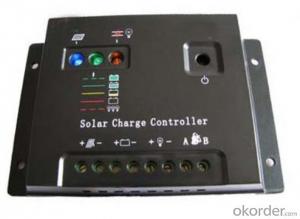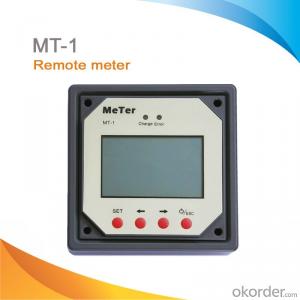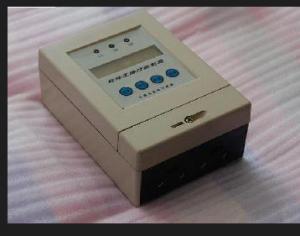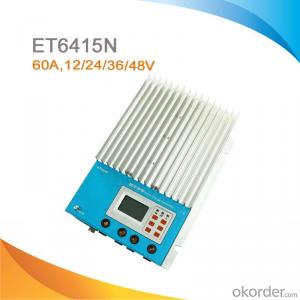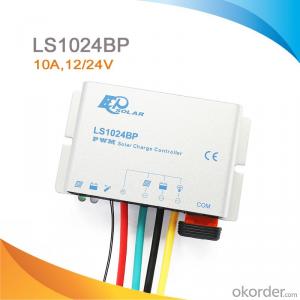Solar Pool Heater Controllers - Solar System Charge Controller / Regulator 30A 12/24/36/48V
- Loading Port:
- China main port
- Payment Terms:
- TT OR LC
- Min Order Qty:
- 10 pc
- Supply Capability:
- 10000 pc/month
OKorder Service Pledge
OKorder Financial Service
You Might Also Like
LCD Display PWM Solar System Charge Controller /Regulator 30A 12/24/36/48V,VS3048BN
1. Product Description:
ViewStar series solar controller is our new generation controller for off-grid solar system, such as street light, solar home system or small power station etc.
2. Features:
1).Excellent EMC design
2).32 bit MCU with high speed
3).High efficient Series PWM charging
4).Four battery type options: Sealed, Gel, Flooded, and USER
5)Intelligent lighting and timer control for solar lighting system
6).12 bit A/D high-precision sampling to ensure accuracy
7).Use MOSFET as electronic switch
8).Full control parameters setting and modification, diversified load control mode
9).Humanized design of browser interface, undertake every operating conveniently
10).Temperature compensation
11).Adopt graphics dot-matrix LCD screen and HMI (human-machine interface) with 4 buttons, integrated menu displaying and operation
12).Energy statistics function
13).RS485 ports with MODBUS communication protocol
3. Electronic Protections:
·PV short circuit protection
·PV reverse polarity protection
·Battery overcharge protection
·Battery over discharge protection
·Battery reverse polarity protection
·Load overload protection
·Load short circuit protection
·Overheating protection
4. Specification:
Model | VS2048BN | VS3048BN | VS4548BN | VS6048BN |
Nominal system voltage | 12/24/36/48V auto work | |||
Rated battery current | 20A | 30A | 45A | 60A |
Rated load current | 20A | 30A | 45A | 60A |
Max. battery voltage | 64V | |||
Equalize charging voltage | Sealed: 14.6V, Flooded: 14.8V, User-defined: 9~17V | |||
Boost charging voltage | Gel: 14.2V, Sealed: 14.6V, Flooded: 14.8V, User-defined: 9~17V | |||
Float charging voltage | Gel /Sealed /Flooded: 13.8V, User-defined: 9~17V | |||
Low voltage reconnect voltage | Gel /Sealed /Flooded: 12.6V, User-defined: 9~17V | |||
Low voltage disconnect voltage | Gel /Sealed /Flooded: 11.1V, User-defined: 9~17V | |||
Self-consumption | ≤15mA(12V); ≤10mA(24V); ≤9mA(36V); ≤8mA(48V) | |||
Grounding | Common negative | |||
Temp. compensation | -3mV/°C/2V | |||
Relative humidity | 10%~90% Non-condensation | |||
Communication | RS485 / RJ45 interface | |||
LCD temperature | -20°C ~ +70°C | |||
Working temperature | -25°C ~ +55°C | |||
Humidity | ≤95% N.C. | |||
Enclosure | IP30 | |||
Overall dimension | 200x103x58mm | 201x109x59mm | 205x119x67mm | 205x174x64mm |
Terminals | 16mm2 | 35mm2 | 35mm2 | 35mm2 |
Net weight | 0.7kg | 0.9kg | 1.2kg | 1.5kg |
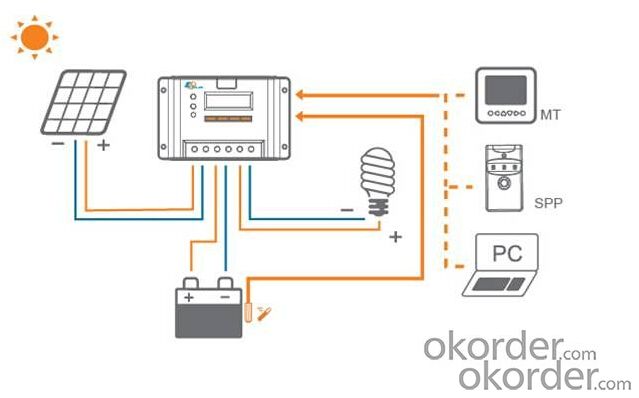
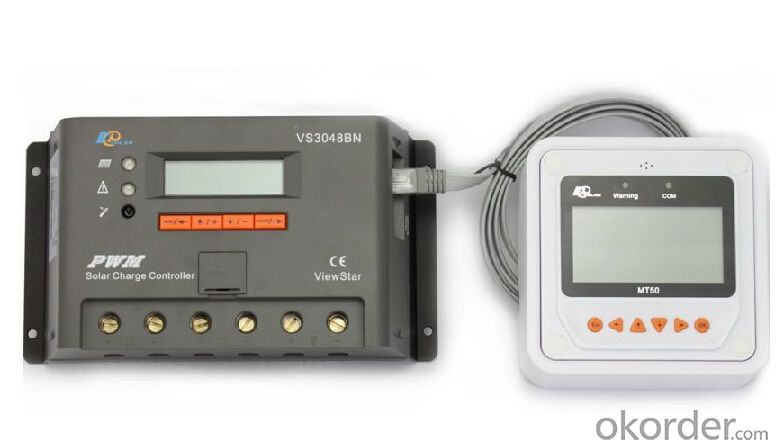
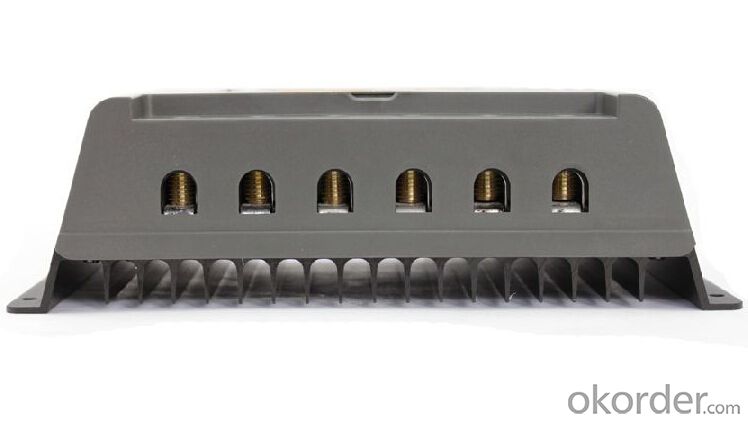
5. FAQ
Q. How many with the MOQ?
A.100PCS
Q, What is the payment method:
A.T/T,L/C
Q, how long with the date of order
A. About 15-25 Days
Q. Where are you main market?
A. Our main market is South Africa and we provide more service to Southeast Asia, Middle East and South America.
Q: What are your certification?
A.CE, ISO, CCC
Q: How long with your warranty.
A. We offer inverter, solar lighting , solar generator one-years warranty ,Sola panel warranty 20 years.
Q: How about with you scale of factory ?
A.We are bigger OEM ( Original Equipment Manufacturer). We have 500 workers and managers .
- Q: What is the maximum power rating a solar controller can handle?
- The maximum power rating a solar controller can handle depends on its specific design and specifications. However, in general, solar controllers are available in a wide range of power ratings, with some models capable of handling up to several hundred watts of solar power. It is important to carefully select a solar controller that is suitable for the specific solar panel configuration and power requirements of the system to ensure optimal performance and longevity.
- Q: What is the maximum number of user profiles supported by a solar controller?
- The maximum number of user profiles supported by a solar controller can vary depending on the specific model and brand. However, in general, solar controllers typically support multiple user profiles, ranging from as few as 2 to as many as 10 or more.
- Q: Do solar controllers require a separate power source?
- No, solar controllers do not require a separate power source. They are designed to work directly with the power generated by solar panels.
- Q: Can a solar controller be used with solar-powered electric fences for livestock?
- Yes, a solar controller can be used with solar-powered electric fences for livestock. The solar controller regulates the charging and discharging of the battery used in the electric fence system, ensuring optimal power supply and performance.
- Q: Can a solar controller be used with a solar-powered sign?
- Yes, a solar controller can be used with a solar-powered sign. A solar controller helps regulate the charging and discharging of the batteries in a solar system, ensuring efficient and optimal power generation. It is crucial in maintaining the performance and longevity of the batteries used in solar-powered signs.
- Q: Can a solar controller be used with solar-powered water purification systems?
- Yes, a solar controller can be used with solar-powered water purification systems. A solar controller regulates the voltage and current from the solar panels to ensure efficient charging of the batteries. This is crucial for the functioning of solar-powered water purification systems as they often rely on stored energy to operate during low sunlight or at night. By controlling the flow of power, a solar controller helps optimize the performance and longevity of the system's components, making it a necessary component for solar-powered water purification systems.
- Q: Can a solar controller be used with solar panel roof mounts?
- Yes, a solar controller can be used with solar panel roof mounts. The solar controller regulates the charging and discharging of the batteries connected to the solar panel system, regardless of the mounting method used.
- Q: Can a solar controller be used in a solar-powered electric scooter charging system?
- Yes, a solar controller can be used in a solar-powered electric scooter charging system. The solar controller plays a crucial role in regulating the flow of electricity from the solar panels to the battery of the electric scooter. It ensures that the charging process is safe and efficient by monitoring and controlling the voltage and current.
- Q: Can a solar controller be used with solar panel window mounts?
- Yes, a solar controller can be used with solar panel window mounts. A solar controller helps regulate the charging process of the solar panel, regardless of its mounting location. It ensures that the solar panel operates optimally, regardless of whether it is mounted on a window or any other surface.
- Q: Are there any energy-saving features in a solar controller?
- Solar controllers typically have various energy-saving features. One notable feature is their ability to regulate and optimize battery charging in the solar system. This ensures efficient charging, preventing overcharging and extending battery lifespan. Additionally, solar controllers often include a low voltage disconnect (LVD) feature. When the battery voltage drops below a certain level, the load automatically disconnects to prevent excessive discharge, which can harm the batteries. Some advanced solar controllers even have maximum power point tracking (MPPT) technology. This technology continuously adjusts voltage and current to match ideal operating conditions, maximizing energy harvested from the solar panels. As a result, the overall energy efficiency of the solar system is significantly improved.
Send your message to us
Solar Pool Heater Controllers - Solar System Charge Controller / Regulator 30A 12/24/36/48V
- Loading Port:
- China main port
- Payment Terms:
- TT OR LC
- Min Order Qty:
- 10 pc
- Supply Capability:
- 10000 pc/month
OKorder Service Pledge
OKorder Financial Service
Similar products
Hot products
Hot Searches
Related keywords
